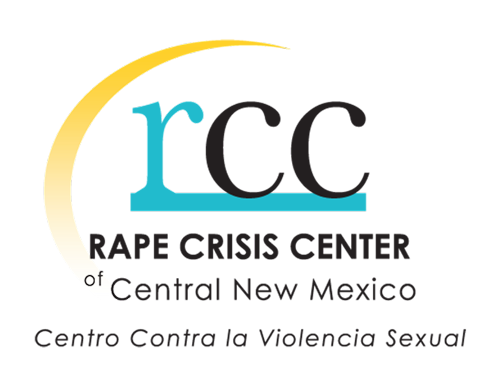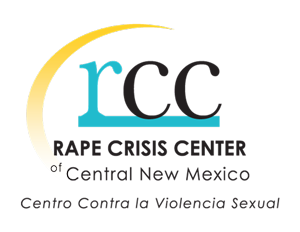
All services at the Rape Crisis Center of Central New Mexico are free of charge.
No matter where you were or what you were doing, if you have been sexually assaulted or abused, you have the right to respectful and confidential care. For more information about counseling services or to schedule an appointment, please call us Monday- Thursday 8:30 am to 5 pm, and 8:30 am- 1 pm on Fridays.
Confidentiality
We are committed to protecting client safety and the privacy of client information. All therapy services provided by The Rape Crisis Center of Central New Mexico (RCCCNM) are strictly confidential.
Who We Serve
We offer an intake appointment for counseling for anyone impacted by sexual violence. This service is for anyone 13 years of age or older. We do not discriminate based on gender identity, race, ethnicity, socio-economic status or immigration status. We work with individuals who are survivors of sexual assault, sexual harassment, and sexual abuse. We also work with survivors’ loved ones. Additionally, we offer services to individuals in the community who find their lives have been impacted by their involvement (secondary and vicarious trauma reactions) with survivors. This includes nurses, physicians, and first responders.
- You do not have to make a police report in order to access RCCCNM’s counseling services.
- You will not be asked about your immigration status.
- You do not have to make a donation in order to access RCCCNM’s counseling services.
Individual Counseling
Counseling is a collaborative effort between the therapist and the client. The client and therapist work together to determine the client’s specific treatment goals. Our therapists provide services in a supportive, respectful, and sensitive manner based on a philosophy that emphasizes client self-empowerment and dignity.
Group Counseling
To participate in group therapy at RCCCNM, clients must first participate in an initial Intake Assessment with a licensed therapist (see Accessing Clinical Services). During the assessment, the therapist will determine whether there is an appropriate match between a client and currently available groups.
You do not have to endure the painful after-effects of sexual violations on your own. Having a safe space to talk about sexual violation means you are not alone. Sharing your thoughts and feelings will allow you to work through this and its impact on your life.
Counseling may help you deal with the painful trauma symptoms that survivors of sexual assault often experience.
Counseling may help you begin to feel connected again to things that can seem to have lost their meaning since the violation or help you to regain a sense of physical and emotional well-being and self-esteem. It can also help you in managing or exploring relationships, goals, or perceptions that have been impacted by your violation.
No matter where you were or what you were doing, the sexual abuse/sexual assault is and was not your fault, and you have the right to respectful, confidential care when you choose.
I felt violated, but I don’t know if what happened was really a sexual violation, can I still get counseling?
Absolutely! It is very common for survivors to not fully be able to understand what happened to them or how they feel about it, especially if it doesn’t match up with the concept they had in their head about what would or would not be a violation.
Often it is hard for people to understand that physical violence is not always used in sexual assaults. The assault itself is still considered an act of violence.
It is important to understand that any sort of unwanted sexual encounters or unwanted sexualized actions taken towards you are sexual violations.
- Fear and overwhelming emotions occur as a result of having someone control your body.
- The offender may actually act affectionately once the victim is sufficiently under their control and may force the victim to speak and act affectionately towards them.
- During incidents of sexual violation, victims may feel that their body has betrayed them-their reactions to the abuse seem to contradict what they actually want. These events may make the survivor question whether an assault really happened.
Sexual assaults and violations are often life-threatening experiences. Whether you’re a child or an adult, one of the things that should be addressed in counseling is that no matter how you reacted or how you survived, you did the right thing.
Counseling is a safe and supportive way to express your feelings and reactions about the sexual violations you have experienced.
Clinical Services at RCCCNM are offered in both English and Spanish. Due to high demand, when you request counseling services, your name may be placed on an Intake Scheduling list. You will be informed about how long the wait may be. You will be called as soon as an intake appointment is available. During the initial Intake appointment, you and a therapist will determine whether and how RCCCNM Services might best meet your needs.
Your intake will include:
- Assessment. During Intake, you will be asked to complete some paperwork and to meet with one of our therapists. You and the therapist will review your general situation, discuss your needs, and develop a plan.
- Planning. You will be informed about services The Rape Crisis Center can offer about other community resources that are available to you.
- Help with Self Care. Your Intake therapist also addresses immediate self-care and safety issues that often accompany trauma.
If RCCCNM is determined to be the best setting for you, your name will be placed on our Counseling Scheduling list. As soon as there is an opening, you will be contacted to set a time and date for your first counseling session.
- Call the Rape Crisis Center from 8:30 am to 5:00 pm Monday through Thursday, and 8:30 am to 1 pm on Friday.
- Ask to speak to the intake therapist. You will be asked for basic information like name, address, and phone number.
- An intake appointment will be set as quickly as both your schedule and our availability allows.
A parent or guardian may call to set up an initial appointment for a minor (13yrs to 15yrs) if it is not feasible for the minor to make the appointment herself/himself. An appointment should not be made if the minor does not want to come. A parent or guardian’s permission to access our counseling services is not required. RCCCNM treats minors in accordance with the NM Children’s Code 32A-6A-14. Please be aware that clients must call to set up their own appointment. It would be helpful if the client signed a Consent to Release Information form so that you, as the referring professional, can speak with the assigned therapist at RCCCNM. Please obtain consent to release information.
It can be very difficult for individuals who are close to someone who has been sexually violated. You may be a parent, a partner, a friend, a sibling, or other family member and it is very likely that you will have your own feelings about what happened to your loved one. You may feel a range of emotions, like sadness, anger, frustration, fear, or anxiety. However you are feeling is normal, just like however the survivor feels is normal. This is key.
Sexual violations can feel very difficult to deal with emotionally. As time passes, significant others may begin to think, ‘why can’t they get over it?’ It is important to recognize that working through these feelings takes time. Survivors need their family and friends to respect their coping mechanisms, whatever they may be, and to provide a supportive environment. This is essential to the healing process. We can help facilitate a better understanding in these situations.
Significant others need to remember that the sexual violation was not the survivor’s fault. It was not something they wanted, caused, or could have prevented. Knowing and believing this helps support the survivor.
People’s responses to the traumatic event change as time passes… Once victims have regained a sense of physical safety, they can assess the damage and begin to adjust or assimilate—a process that may take months or years. It is primarily their social context that re-establishes the feeling of safety vital for successful recovery. Such support may come from anybody who can help when one’s own inner resources fail. This initial social response will shape the way the victim comes to perceive the safety of the world and the benevolence or malevolence of others. If people in the social environment refuse to step in when a person’s own resources are exhausted, this may become as great a source of devastation as the original trauma itself…
Bessel A. van der Kolk, MD
In Terror’s Grip: Healing the Ravages of Trauma
24-Hour Hotline 505-266-7711
Puede llamar 24 horas. Se habla Español


